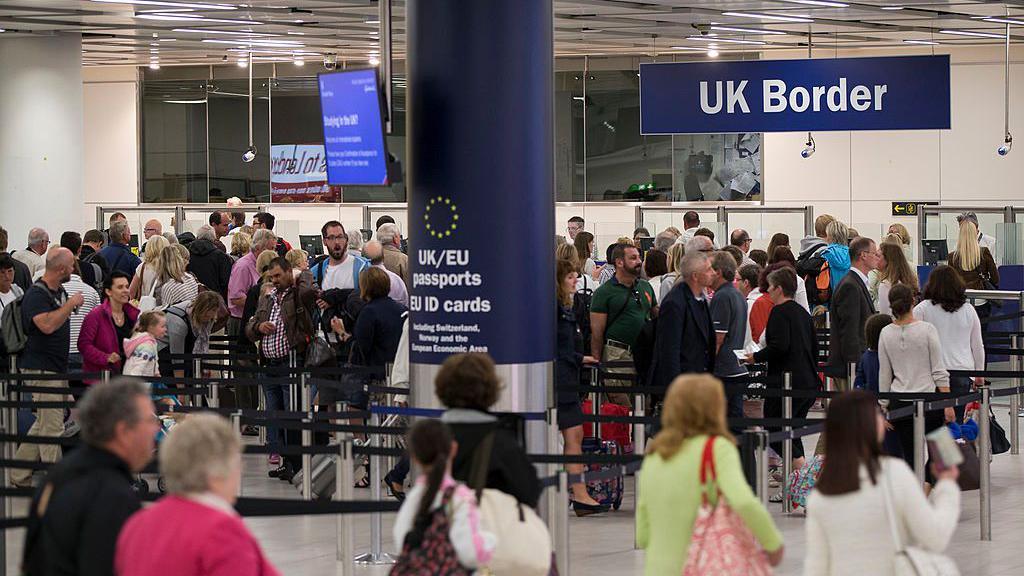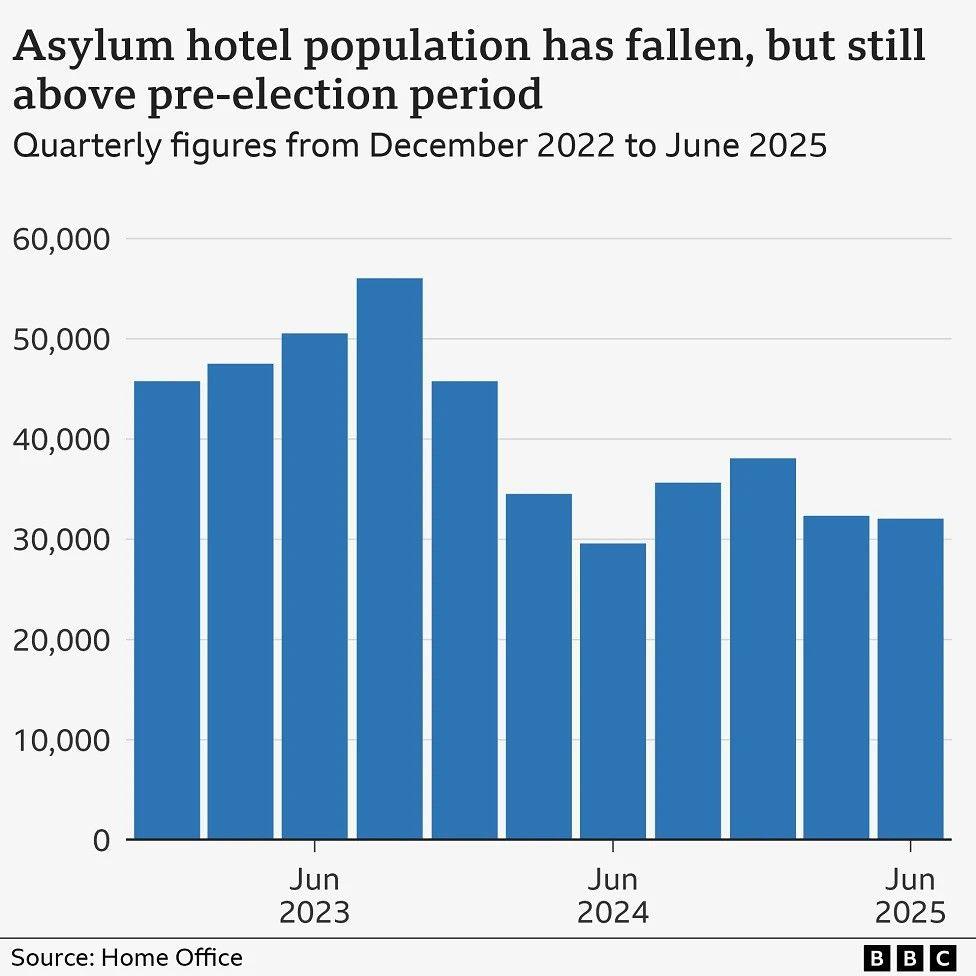Record 111,000 UK asylum applications in past year, figures show

- Published
A record 111,000 asylum applications were made to the UK during the year to June, but the government is processing cases faster, new Home Office figures show.
This is an increase of 14% from the previous year, and it is higher than the peak of 103,000 in 2002.
But officials are processing more cases than before the general election, meaning that over the long term there may be fewer people in the system needing housing support.
The latest data, which covers Labour's first year in office, comes as the government faces growing pressure over immigration.
The figures also showed 71,000 cases, relating to 91,000 people, were awaiting an initial decision. The number of cases is lower than the number of people since one case can also cover the main claimant's family.
That backlog is almost half the peak of 134,000 cases at the end of June 2023.
This means that there are 18,536 fewer people waiting for a decision today than there were in March.
The numbers of asylum seekers in hotels has risen slightly to 32,059 - a figure higher than when Labour came to power, but well below a peak of 56,000 in September 2023 under the Conservatives.
Labour has pledged to clear the backlog by 2029, pledging to cut Channel crossings and to open new government-run accommodation.
Ministers hope to end the use of hotels over the long term. However that depends on how quickly they can remove people who have no case to be in the UK.
Do asylum figures show if government's strategy is working?
- Published21 August
Most areas with asylum seeker hotels have Labour councils
- Published21 August
Don't put Epping migrants in hotels or flats, Tories say
- Published20 August
Asylum seekers who cannot financially support themselves are placed in housing while their claims and appeals are considered.
In the year ending June 2025, the Home Office forcibly removed 9,100 people – up a quarter on the previous year.
More than half were foreign national offenders who were being deported at the end of sentences.
Meanwhile, the High Court on Tuesday ruled a hotel in Epping, Essex, should stop housing asylum seekers after a legal challenge by the local council.
Other councils across the country, including some run by Labour, are now considering legal action.
Most asylum claims were made by people from Pakistan, very few of whom arrived in the UK on small boats - rather, most arrived legally on work or study visas and only later claimed asylum.
Meanwhile, most people arriving by small boat were from Afghanistan.
'I feel left behind'
Among the backlog of asylum claims is Daastan's - who did not want to use his real name.
The 26-year-old fled Afghanistan in 2023, fearing for his life after his father and brother were targeted by the Taliban.
After arriving in the UK, he applied for asylum and the Home Office found him a hotel room in Yorkshire, where he has been ever since.
"You escape one problem and now you're in another problem," he told the BBC.
His claim was denied after around a year, and he is now awaiting the outcome of an appeal.
He is given three meals a day and is allowed to leave for a walk if he signs out with a guard. Otherwise, he spends most of his days in silence as his roommate does not speak English.
One day, through his window, he watched as guards and police surrounded the hotel and stopped protestors from getting any closer.
"All we asylum seekers wanted was a shelter so the government put us in a hotel. That wasn't our choice," he said. "We haven't done anything."

Elsewhere, Godgive - who also did not want to use her real name - told the BBC she felt "left behind" and "stuck" in the asylum system.
She has not seen her six-year-old son since she left Cameroon, fleeing violence, three years ago.
Waiting for the outcome of her claim, she lives in a shared house with other asylum seekers provided by the Home Office in the north-east of England.
A house manager comes regularly to sweep her bedroom and make sure she has no forbidden items, like a TV. There is little privacy.
Godgive said she considered ending her life at one stage: "I needed to stop living. It was too much."
Unable to work or study, she said she dreamt of volunteering or training herself in new skills – anything to give her purpose and a way to contribute.
"I don't know where to go and I don't know when it's going to change."
How many people cross the Channel in small boats?
- Published22 October
Migration: How many people come to work and study in the UK?
- Published2 September
Government spending on asylum in the UK was down by 12%, the new figures show.
The total stood at £4.76bn in the year ending March 2025, down from £5.38bn the previous year.
It covers Home Office costs related to asylum, including direct cash support and accommodation, but not costs relating to intercepting migrants crossing the Channel.
Specific costs for hotels were not published in the latest data, but Home Office figures released in July showed £2.1bn was spent on hotel accommodation - down from £3bn the previous year.
The data for the year to June 2025 also showed that:
Small boat arrivals accounted for 88% of arrivals, at 43,000
This was 38% higher than the previous year, but slightly lower than the peak in 2022 of 46,000 people
More than half of those arriving came from Afghanistan, Eritrea, Iran, Sudan and Syria
Afghans were the most common nationality, accounting for 15% of small boat arrivals (6,400)
Since January 2018, three-quarters of small boat arrivals were men, while only 16% were children
5,011 children - those under the age of 18 - crossed by small boat to apply for asylum in the year to June
Home Secretary Yvette Cooper said Labour has "strengthened Britain's visa and immigration controls, cut asylum costs and sharply increased enforcement and returns".
She blamed the "broken immigration and asylum system" and said the previous Conservative government had left it in "chaos".
Shadow home secretary Chris Philp said the government is "failing" and has lost control of our borders".
Liberal Democrat spokesperson Lisa Smart MP said the asylum backlog has been "far too large for far too long".
"The Conservatives trashed our immigration system and let numbers spiral. Now this Labour government is failing to get a grip on the crisis," she said.
If you are suffering distress or despair, details of help and support in the UK are available at BBC Action Line.
Get in touch
How have you been affected by the issues raised in this story? Get in touch.
Related topics
- Published2 September

- Published22 October
